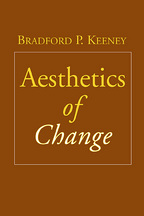Aesthetics of Change
Bradford P. Keeney
Paperbacke-bookprint + e-book
Paperback
orderJuly 22, 2002
ISBN 9781572308305
Price: $36.00217 Pages
Size: 6" x 9"
Copyright Date: 1983
The fundamental concern of psychotherapy is change. While practitioners are constantly greeted with new strategies, techniques, programs, and interventions, this book argues that the full benefits of the therapeutic process cannot be realized without fundamental revision of the concept of change itself. Applying cybernetic thought to family therapy, Bradford P. Keeney demonstrates that conventional epistemology, in which cause and effect have a linear relationship, does not sufficiently accommodate the reciprocal nature of causation in experience. Written in an unconventional style that includes stories, case examples, and imagined dialogues between an epistemologist and a skeptical therapist, the volume presents a philosophically grounded, ecological framework for contemporary clinical practice.
“Aesthetics is a handbook of [cybernetic ideas] relevant to the clinician with an emphasis on helping the clinician understand the therapeutic context in which he participates and influences....Encourages us to reach for a more poetic, aesthetic approach to our thinking about and dealings with our clients....The argument made that is persuasive is that cybernetic thinking can indeed enhance a therapist's chances of untying the knots of mental process embodied in the stories and experiences clients and therapists construct.”
—AFTA Newsletter
“This is a rare text which deals unashamedly with complex theoretical issues in a way that relates directly to practice. It is unlikely that anyone who reads this with an inquiring mind will fail to be influenced in their practice.”
—Journal of Family Therapy
“Written almost 20 years ago, Aesthetics of Change is a classic in the field of family therapy. It has aged well. The notions it so intricately spins forth are still vibrant, still vital for therapists and students who want to learn to think systemically—wisely—about the context and practice of therapy. Readers will appreciate Keeney's firm, yet relaxed, grasp of Bateson's ideas, his clear explanations, and his sense of irreverence.”
—Douglas Flemons, PhD, Professor and Director, Brief Therapy Institute, Nova Southeastern University, and author of Of One Mind
“An astounding, clear, and brilliant exposition of cybernetic epistemology. A major contribution to understanding family therapy!”
—Luigi Boscolo, MD
“A persuasive work which will help make the elusive concepts of epistemology and cybernetics accessible to the psychotherapeutic community.”
—Mary Catherine Bateson, PhD
“Family therapy has been an endeavor in search of a theory. Keeney's book fills in that all-important superstructure that every field needs in order to achieve its own conceptual framework.”
—Lynn Hoffman, MSW
“Aesthetics of Change is really the Rubik's cube in book form. There are six chapters of different colors which can be rotated around a conceptual inner core to create an almost infinite variety of patterns. It's fun and exciting!”
—Carl Whitaker, MD
Table of Contents
1. Fundamentals of Epistemology2. Cybernetic Epistemology
4. A Cybernetic Description of Family Therapy
5. Cybernetics of Therapeutic Change
6. An Aesthetic Base for Family Therapy
About the Author
Bradford P. Keeney, PhD, has worked at some of the most respected psychotherapy centers in the United States, including the Ackerman Institute in New York City, the Karl Menninger Center in Topeka, and the Philadelphia Child Guidance Clinic. He has served as Director of clinical doctoral programs at Texas Tech University and Nova University, and as Director of Scholarly Studies at the University of St. Thomas. He is the author of numerous classic works in the field of family therapy.Audience
Family therapy practitioners, researchers, and students.May serve as a supplemental text in graduate-level courses.
